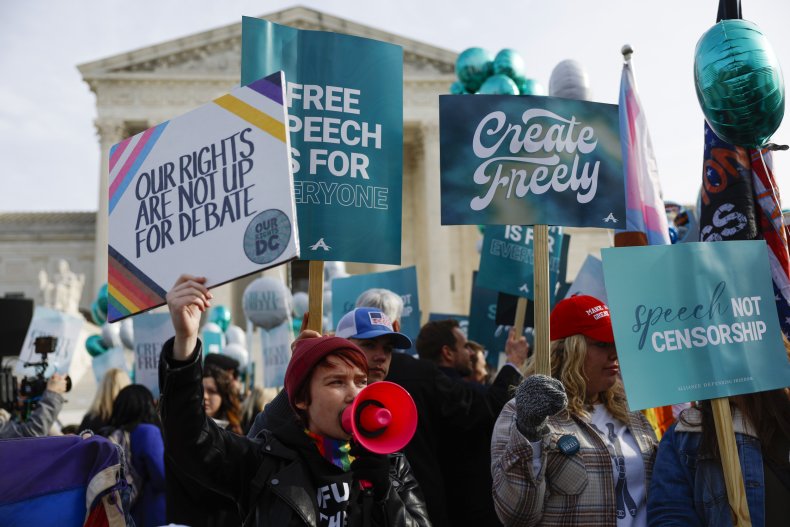303 Creative v. Elenis is a landmark victory for free speech. The Supreme Court reaffirmed the foundational principle that the Constitution prohibits the government from forcing Americans to say something they don’t believe. As the Court wrote, “The First Amendment envisions the United States as a rich and complex place where all persons are free to think and speak as they wish, not as the government demands.” 303 Creative is a win for every American.
Yet, upset by the landmark decision in 303 Creative, radical detractors are making excuses, spreading lies, and calling the case “made up” because Lorie Smith—the artist who runs the 303 Creative design studio and refuses to make websites for a same-sex wedding—filed her suit before Colorado prosecuted her. Lawyers with the NAACP and former federal prosecutors should know better. Their statements demonstrate a blatant disregard for truth and a misunderstanding of basic legal principles.
These activist lawyers, taking their cue from a June 29 article in the New Republic, falsely insinuated that Lorie or her attorneys with Alliance Defending Freedom fabricated a request for custom design work for a same-sex wedding. No one disputes—and IT data confirms—that Lorie received the request from a third party in September 2016, after she filed her case. The suggestion that Lorie or ADF manufactured the request is false. As even one liberal Supreme Court commentator acknowledged, “There is no evidence whatsoever that either 303 Creative or ADF (its counsel) fabricated the fake request. The allegation makes no sense. Why fabricate the request after, rather than before, the complaint is filed? And why make the fraud so easy to detect?”
To suggest, based on zero evidence, that Lorie’s attorneys should be sanctioned, disbarred, criminally prosecuted for fraud, or (ironically) sued for defamation is irresponsible at best.

Anna Moneymaker/Getty Images
Further, for detractors to pretend that a request that nowhere featured in the Supreme Court’s decision was crucial to the case demonstrates ignorance regarding the legal principles involved. The legal question is whether Lorie faced a credible threat of enforcement, and the answer to that question is a clear “yes.”
Pre-enforcement cases like Lorie’s happen all the time, across the ideological spectrum. They’ve been a hallmark of civil rights litigation for over a hundred years. Indeed, many on the Left and the Right—organizations like the ACLU, NAACP, Lambda Legal Defense and Education Fund, the National Rifle Association, and liberal and conservative states—routinely bring such lawsuits to protect people from unconstitutional laws before the government wrongly punishes them. In just the last 10 years, the Supreme Court has heard more than a dozen pre-enforcement cases, and lower courts rule on hundreds of them each year.
If prosecution were the price of courtroom admission, unconstitutional laws might long remain on the books, as few litigants would be willing to await prosecution before challenging them. No one should be required to risk prosecution and jail to assert their constitutional rights.
Under more than a century’s worth of precedent, the Supreme Court agreed that Lorie demonstrated a credible threat that Colorado would enforce its unconstitutional law if she expanded her website business to include wedding websites. Throughout this case, Colorado has made clear that it would prosecute Lorie if she entered the wedding business and made only websites consistent with her faith. The Supreme Court noted that, through seven years of litigation, Colorado had steadfastly refused to do the one thing necessary to make the case disappear: “disavow future enforcement” proceedings against Lorie.
The Court also found persuasive the fact that Colorado allows anyone to file a complaint, and the state conceded it had no discretion but to pursue such a complaint.
Lorie’s case was far stronger than many other pre-enforcement cases. Colorado has a long history of aggressively enforcing its law against what the Supreme Court found to be “nearly identical conduct” by individuals like Jack Phillips of Masterpiece Cakeshop. With Colorado’s aggressive enforcement of its law, who can blame Lorie for filing suit?
Every American should be thrilled that the Supreme Court upheld the right to free speech for all in 303 Creative. That Lorie was able to bring a suit before she was subjected to prosecution and faced penalties is another cause for celebration.
Lorie is part of a long line of civil rights litigants who won their cases and secured liberty for themselves and others. The invention about one request she received is a very tired attempt to punish supporters of free speech and to undermine an historic victory.
Kristen Waggoner is CEO, president, and general counsel for Alliance Defending Freedom (@ADFLegal) and argued the case, 303 Creative v. Elenis, before the U.S. Supreme Court on behalf of Lorie Smith. Erin Hawley is senior counsel for ADF and served as co-counsel and second chair in the case at the high court.
The views expressed in this article are the writers’ own.

